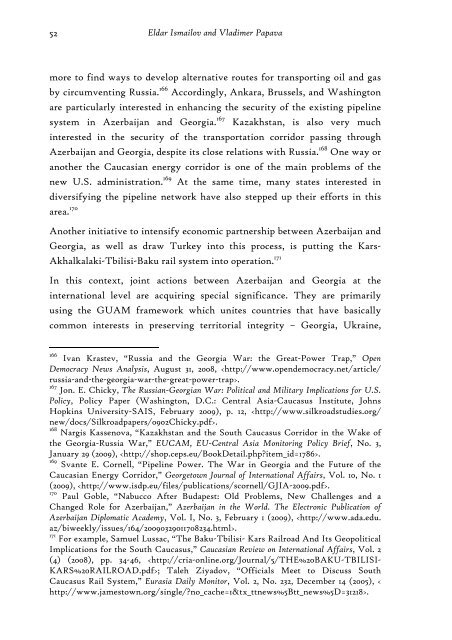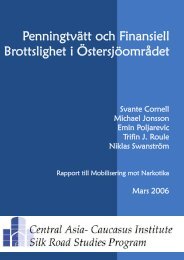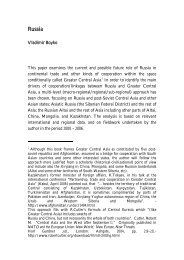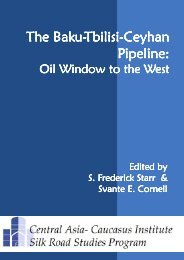Eurasianism and the Concept of Central Caucaso-Asia
Eurasianism and the Concept of Central Caucaso-Asia
Eurasianism and the Concept of Central Caucaso-Asia
You also want an ePaper? Increase the reach of your titles
YUMPU automatically turns print PDFs into web optimized ePapers that Google loves.
52<br />
Eldar Ismailov <strong>and</strong> Vladimer Papava<br />
more to find ways to develop alternative routes for transporting oil <strong>and</strong> gas<br />
by circumventing Russia. 166 Accordingly, Ankara, Brussels, <strong>and</strong> Washington<br />
are particularly interested in enhancing <strong>the</strong> security <strong>of</strong> <strong>the</strong> existing pipeline<br />
system in Azerbaijan <strong>and</strong> Georgia. 167 Kazakhstan, is also very much<br />
interested in <strong>the</strong> security <strong>of</strong> <strong>the</strong> transportation corridor passing through<br />
Azerbaijan <strong>and</strong> Georgia, despite its close relations with Russia. 168 One way or<br />
ano<strong>the</strong>r <strong>the</strong> Caucasian energy corridor is one <strong>of</strong> <strong>the</strong> main problems <strong>of</strong> <strong>the</strong><br />
new U.S. administration. 169 At <strong>the</strong> same time, many states interested in<br />
diversifying <strong>the</strong> pipeline network have also stepped up <strong>the</strong>ir efforts in this<br />
area. 170<br />
Ano<strong>the</strong>r initiative to intensify economic partnership between Azerbaijan <strong>and</strong><br />
Georgia, as well as draw Turkey into this process, is putting <strong>the</strong> Kars-<br />
Akhalkalaki-Tbilisi-Baku rail system into operation. 171<br />
In this context, joint actions between Azerbaijan <strong>and</strong> Georgia at <strong>the</strong><br />
international level are acquiring special significance. They are primarily<br />
using <strong>the</strong> GUAM framework which unites countries that have basically<br />
common interests in preserving territorial integrity – Georgia, Ukraine,<br />
166 Ivan Krastev, “Russia <strong>and</strong> <strong>the</strong> Georgia War: <strong>the</strong> Great-Power Trap,” Open<br />
Democracy News Analysis, August 31, 2008, .<br />
167 Jon. E. Chicky, The Russian-Georgian War: Political <strong>and</strong> Military Implications for U.S.<br />
Policy, Policy Paper (Washington, D.C.: <strong>Central</strong> <strong>Asia</strong>-Caucasus Institute, Johns<br />
Hopkins University-SAIS, February 2009), p. 12, .<br />
168 Nargis Kassenova, “Kazakhstan <strong>and</strong> <strong>the</strong> South Caucasus Corridor in <strong>the</strong> Wake <strong>of</strong><br />
<strong>the</strong> Georgia-Russia War,” EUCAM, EU-<strong>Central</strong> <strong>Asia</strong> Monitoring Policy Brief, No. 3,<br />
January 29 (2009), .<br />
169 Svante E. Cornell, “Pipeline Power. The War in Georgia <strong>and</strong> <strong>the</strong> Future <strong>of</strong> <strong>the</strong><br />
Caucasian Energy Corridor,” Georgetown Journal <strong>of</strong> International Affairs, Vol. 10, No. 1<br />
(2009), .<br />
170 Paul Goble, “Nabucco After Budapest: Old Problems, New Challenges <strong>and</strong> a<br />
Changed Role for Azerbaijan,” Azerbaijan in <strong>the</strong> World. The Electronic Publication <strong>of</strong><br />
Azerbaijan Diplomatic Academy, Vol. I, No. 3, February 1 (2009), .<br />
171 For example, Samuel Lussac, “The Baku-Tbilisi- Kars Railroad And Its Geopolitical<br />
Implications for <strong>the</strong> South Caucasus,” Caucasian Review on International Affairs, Vol. 2<br />
(4) (2008), pp. 34-46, ; Taleh Ziyadov, “Officials Meet to Discuss South<br />
Caucasus Rail System,” Eurasia Daily Monitor, Vol. 2, No. 232, December 14 (2005), <<br />
http://www.jamestown.org/single/?no_cache=1&tx_ttnews%5Btt_news%5D=31218>.






